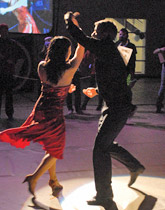
"Everyone out on the dance floor!" an unseen student yells into a microphone. "It's time for Face-Off!" As participants surge into the area of the Weigand Gymnasium roped off for competitions, Caroline Size steps back to watch. The senior business student has been there all evening, but she hasn't had time for much dancing. As one of the organizers of the dance marathon on the university's Pittsburgh campus, she has been preoccupied with ensuring that various events and competitions run smoothly during the six-hour marathon.
This isn't your traditional, last-couple-standing, all-night dance marathon. Students have formed teams to compete in dance-related contests. Many of the competitions involve the limbo and other era-themed dances. Not Face-Off. Students must make up dance moves based on subjects that flash on two massive screens flanking the dance floor. When Face-Off begins, the words "Scotty Dog" appear on the screen. Three competing students drop to all fours, doing their best to dance like a Scotty dog, prompting laughs, cheers, and some groans from the crowd. The judges pick a winner, and three new students step up, eagerly awaiting the screen to refresh with a new theme.
Size can't help but be pleased, and not just because everyone is having a good time. The Dance Marathon also serves a nobler purpose: the participants' entrance fees go toward The Hero Program, a Pittsburgh-based not-for-profit dedicated to transforming the lives of families with terminally ill children. The Hero Program currently sponsors seven families in Pittsburgh, and other branches nationwide are in development.
Size is partly responsible for the expansion. She worked for The Hero Program last summer after its CEO came to Carnegie Mellon and spoke to a group of student-athletes that included Size, a member of the Tartans' volleyball team. Her job was to help create an expansion plan for the organization. She researched her way to creating a manual that would guide anyone, anywhere on how to start a branch of The Hero Program—including how to host dance marathon fundraisers.
Based on the packed crowd in the campus gym, dance marathons look like a good idea. For the Face-Off competition, a champion is declared, but nobody seems obsessed with winning or losing. Size and the other organizers end up raising more than $5,000 for The Hero Program by night's end. They've also established a student organization to ensure that Dance Marathon will continue for years to come.
—Shannon Deep (CMU'10, HNZ'11)



